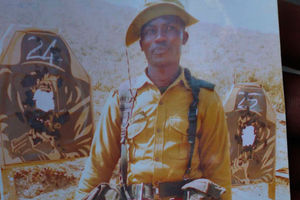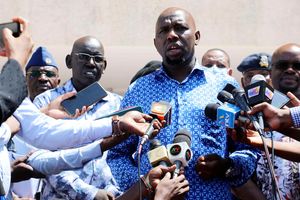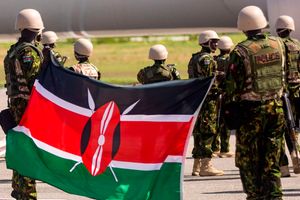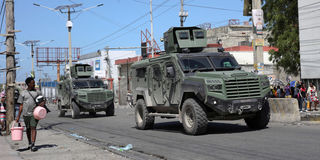
Armoured vehicles of the Kenyan peace-keeping mission patrol as residents flee Delmas 30 neighbourhood due to gang violence, in Port-au-Prince, Haiti on February 25, 2025.
Samuel Tompoi was part of a patrol team conducting a security operation in Port-au-Prince on February 23, 2025 when armed gangsters opened fire and killed him.
Barely one month later, Benedict Kabiru Kuria was also killed by a Haitian gang, which is still holding his body.
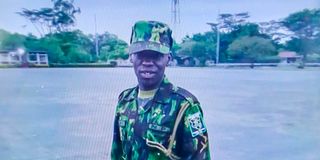
A picture of Benedict Kabiru Kuria, a police officer who went missing in Haiti.
Two other Kenyan police officers, who were recently injured, have been airlifted to the Dominican Republic for treatment following another confrontation with gangs.
Mr Kuria was in a Mine Resistant Ambush Protected (MRAP) vehicle which developed mechanical problems and got stuck in a ditch, giving the gangsters a chance to attack.
Funding shortages, faulty equipment and bickering among financiers have led experts, and many Kenyans, to ask – does Kenya really need to be in Haiti?
The question arises on account of Kenya not sharing a physical border with Haiti, or having any trade ties with the Caribbean island nation.
Kenya only developed diplomatic relations with Haiti in September, 2023 on the backdrop of the former’s promise to deploy police officers for the mission.
The government has, for months, defended its decision to deploy 600 police officers to Port-au-Prince, maintaining that the move is part of protecting global peace.
Kenya committed to send 1,000 officers for the mission. So far, 700 have been deployed, drawn from the General Service Unit (GSU), Anti-Stock Theft Unit (ASTU), Rapid Deployment Unit (RDU) and all the Female Special Weapon and Tactics Team (SWATT).
The condition of equipment being used by Multinational Security Support (MSS) mission has been a topic of discussion among themselves as they claimed that they were in a poor state.
A source told the Nation that more than 10 armoured vehicles that the police officers had received as donations are grounded.
“The armoured cars usually develop mechanical problems when we are on normal patrols or during missions. That is how one of our officers was taken away by the gangs,” said the police source.
The Kenyan-led mission was expected to ensure that Haiti is stable enough to hold elections by February next year, which meant a quick eradication of the more than 300 criminal gangs that have captured every aspect of life in that country.
But with 10 months to the February deadline, the multinational security forces are seemingly outmatched as many of the Haiti gangs have put up a united front amid the numerous troubles eating at the UN-backed coalition. Barely one month after US President Donald Trump was sworn in, he froze a Sh1.6 billion disbursement to the Haiti mission. He has frozen several other US funding for other projects across the world under his “America first” agenda. Kenya downplayed the freeze, saying it had enough funds to finance the mission.
Around the same time, there was disquiet among Kenyan police officers stationed in Port-au-Prince over delayed salaries.
Kenya has sunk in at least Sh5 billion with the hope that the UN will quickly refund the money.
Parliament approved an additional Sh2.5 billion allocation to the National Police Service in March towards supporting the Haiti mission. This follows the approval of Sh2.1 billion that had been allocated last year.
According to Mr Tompoi’s family, the MSS arranged counselling sessions following his death which troubled his young wife. Plans are underway to compensate his family.

The late Samuel Kaetuai, the police officer who was killed in Haiti.
But his colleagues in Haiti claim that the compensation rate is not entirely clear to them.
An officer who confirmed that Mr Tompoi’s family is set to get a financial package did not share the compensation rate.
“We have never been told about the compensation process and that to us remains a challenge,” said an officer who was deployed in the second contingent that left Kenya for the Caribbean nation in July last year.
Mr Kabiru’s family said it is happy about the efforts being made by the National Police Service following his demise. He was the breadwinner.
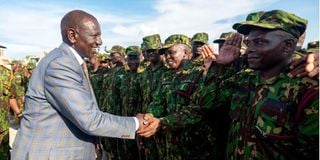
President William Ruto shakes hands with Kenyan police officers when he arrived in Port-au-Prince, Haiti.
The USA, a key financier in the MSS mission, in November last year sought to have it changed to a UN peacekeeping force. That would have placed more financial responsibility on the UN, rather than the US. But Russia and China vetoed that push.
David Karani, a Kenya Human Rights Commission officer, said that Kenya should recall its police officers.
“The government should rethink this mission because we do not share a border with Haiti. Recently, Kenyan chiefs were abducted, our officers should be around to deal with such issues at home,” he said Mr Karani.
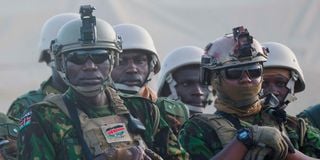
Members of the first contingent of Kenyan police stand in formation after arriving in the Caribbean country as part of a peacekeeping mission, in Port-au-Prince, Haiti June 26, 2024.
George Musamali, a security consultant, said that Kenya jumped into a risky mission by entering Haiti.
“The problem in Haiti needs a political solution,” he said.
According to the Global Observatory (GO), a publication of the International Peace Institute, Kenya and US are largely footing the bill in Haiti.
The GO further stated that the framework used for the Haiti mission left it without the benefit of the UN’s extensive operational, financial, and administrative assistance.
“As a result, nearly every aspect of the MSS has depended on voluntary support from a handful of member states. Kenya and the United States have carried the lion’s share of this burden,” it states in its report.
Some of the officers stationed in Haiti claim that their families have been kept in the dark about their welfare and status.

Kenyan police forces patrol a neighbourhood, a day before the arrival of US Secretary of State Antony Blinken who will visit the Caribbean country as Washington seeks to solidify the UN-backed security mission, in Port-au-Prince, Haiti September 4, 2024.
Between 1993 and 2019, there were four unsuccessful UN missions in Haiti.
There was the UN Mission in Haiti, UN Support Mission in Haiti, UN Stabilisation Mission in Haiti, and UN Mission for Justice Support in Haiti.

